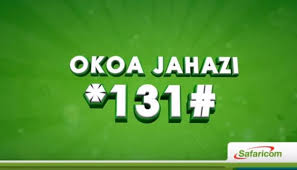
“A customer asked me to buy him data bundles. I bought him some bundles worth Sh. 50. But Sh. 275 was deducted from my M-PESA account. Wondering why the amount was deducted, I called your customer care centre and explained my complaint. I was informed that the amount was deducted because the customer for whom I had bought the data bundle had an outstanding Okoa Jahazi unpaid debt. How safe is the money in my M-PESA account?”
This was the gist of the complaint that a Kenyan identified as Lovely Lovel made to Safaricom at 20.30 pm on November 16. The complaint has gone on to mix chaff and wheat in a field of sensational claims that money is being deducted from M-PESA accounts to settle the unpaid credit advances of other people without the owners’ consent. But how true are these claims? Bizna Kenya finds out:
The birth of Okoa Jahazi
On April 1, 2009, Safaricom launched a new service that would enable its PrePay customers to access airtime on credit and pay later when in situations where they cannot immediately purchase airtime or during emergencies.
The service dubbed Okoa Jahazi initially allowed PrePay customers to access up to Sh. 50 credit advance. “Getting a little extra airtime when you really need it, could help you a lot. We are happy to announce that we will be offering our PrePay subscribers credit advance. So, the next time you have to make that all important call and your balance is less than Sh. 5, just dial *131#,” Safaricom announced during the launch.
At first, the credit advance facility was only applicable on Safaricom to Safaricom calls and SMS only. Customers would be charged a minimal service fee of Sh. 5 for using the service and would be required to repay the advance credit within three days using their next top-up.
A customer who failed to repay the credit advanced within three days was barred from accessing the facility for a period of 30 days. Similarly, the service was availed to subscribers who had been on the network for at least 12 months, and whose usage for the previous week was more than Sh. 50.

Since then, Safaricom has been developing the lending facility to attract more users and has set credit limits ranging from Sh. 20 to Sh. 1,000 for each subscriber depending on their usage patterns.
“Okoa Jahazi has established itself as the convenient alternative for subscribers without cash in hand, while simultaneously boosting Safaricom’s revenues,” says Wilson Kirui, a market analyst based in Nairobi. For example, by October 2016, subscribers had been given advance credit worth Sh. 31 billion, setting Safaricom’s credit line above that of some local lending saccos, microfinance institutions and some banks.
The evolution
Today, the evolution of the Okoa Jahazi facility has seen borrowers who are unable to repay denied the facility for just seven days. Upon their expiry, the subscriber is restricted to borrowing small amounts to enable them to rebuild their borrowing profile. “The facility works in the same way that bank loans work. The more you honour your repayments, the higher the credit you get,” says Mr. Kirui.
Granted, both the formal and inform credit markets are bound to have serial defaulters. For example, says Kirui, one of the simplest ways a borrower can evade repaying their credit advance is by using third parties to send them fresh cash. “To avoid this trap, Safaricom has typically ensured that credit advance defaulters can only receive fresh airtime or data bundles from their acquaintances once their outstanding debts are cleared,” he says. But won’t this mean that other people will be footing unwanted bills, unknowingly just as Ms. Lovel claims to have done? “Not at all,” says Mr. Kirui. “Safaricom as a market leader cannot afford to compel customers to foot outstanding Okoa Jahazi debts that they didn’t apply for or guaranteed,” he says.
Can you be deducted?
So how does this work? When you set out to Sambaza data bundle or airtime to an acquaintance with an outstanding Okoa Jahazi, you will be notified that the recipient has an Okoa Jahazi of a certain amount.
You will also be notified that proceeding to send the data bundle or airtime will result in a deduction of the amount or value being transferred. You will then be given the option to either go ahead with the purchase and be deducted the whole amount or to cancel it altogether. You will only be deducted the amount if you agree to go ahead with the purchase. “It is just the same as sending money into a bank account that has an outstanding loan. The amount will be received and could be deducted to recover the outstanding debt,” says Kirui.
Evidently, then, says Kirui, Ms. Lovel had inadvertently proceeded to send the bundles without following the alerts. To ease this procedure and ensure that customers do not inadvertently send money to defaulting recipients, Safaricom is now providing customers with the choice to offset the Okoa Jahazi balance and purchase additional resources within the same transaction.
“The transaction will not go through if a customer chooses not to offset the Okoa Jahaza balance. If a customer chooses to purchase resources and also offset the Okoa Jahazi, they will again be presented with a second confirmation message where they can confirm the transaction by keying their M-PESA PIN,” says Safaricom in a statement.
For example, to Sambaza a data bundle, dial you can dial *544#, select 98 to see ‘More Than’, pick option 13 to send a data bundle to another customer.
In the last step, you will be provided with the choice to also sambaza them additional airtime to offset their Okoa Jahazi, should there be an outstanding balance. Once you choose to accept, you will then be directed to the M-PESA menu and again asked to confirm the transaction by keying in your password.







